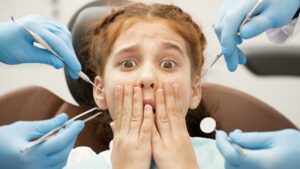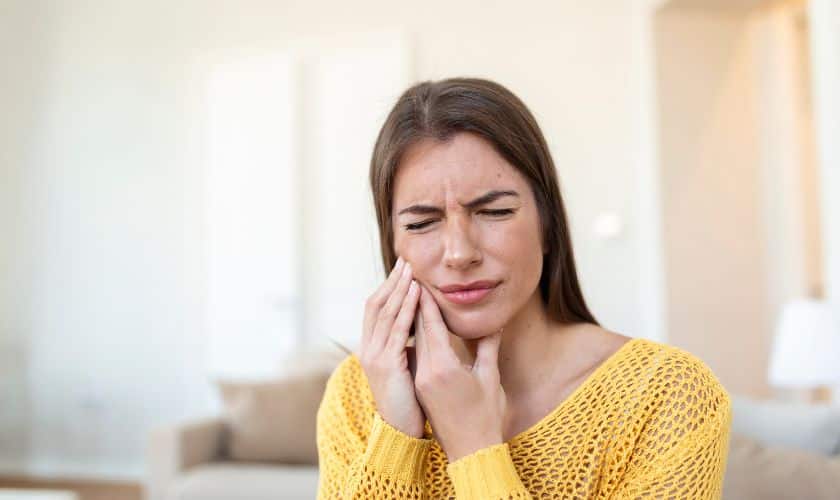Dental anxiety is a common issue among many people. It is characterized by an intense fear of visiting the dentist or undergoing dental procedures. Dental anxiety can delay seeking dental treatment, worsening the dental condition and leading to more extensive treatments. Fortunately, there are natural ways to relieve dental anxiety that can make dental visits more comfortable and less stressful.
Signs That You Have Dental Anxiety
Dental anxiety is a common feeling that affects many people. It can range from mild to severe and can be caused by various factors, such as past negative experiences or fear of the unknown. Signs of dental anxiety include:
- An increased heart rate
- Sweating
- Dizziness or nausea
- Trembling hands
- Difficulty breathing A
- Avoidance of the dentist altogether
If you are experiencing any of these symptoms before your next dental appointment, it may be worth speaking with your dentist about ways to manage them so that you feel more relaxed during treatment.

Natural Ways To Relieve Dental Anxiety
Deep Breathing And Relaxation Techniques
Deep breathing and relaxation techniques can be very effective in reducing dental anxiety. Breathing exercises can help to slow down your heart rate, lower your blood pressure, and calm your nerves. When you feel anxious, take a deep breath and exhale slowly. Repeat this several times until you feel more relaxed. You can also try other dental relaxation techniques, such as progressive muscle relaxation, meditation, or yoga.
Aromatherapy
Aromatherapy is a natural way to reduce anxiety and promote relaxation. Essential oils such as lavender, chamomile, and peppermint can help to calm the mind and reduce stress. You can use essential oils by diffusing them in the air, adding a few drops to a warm bath, or applying them topically to your skin.
Distraction Techniques
Distraction techniques can help to take your mind off your anxiety and make dental visits more bearable. For example, you can bring a book, listen to music, or watch a movie on your phone during your dental appointment. Some dentists even provide headphones or TVs in the treatment rooms to help patients relax.
Acupuncture
Acupuncture is an ancient Chinese therapy that involves the insertion of thin needles into specific points on the body. It is believed that acupuncture is effective for stimulating the release of endorphins, natural painkillers, and mood boosters. In addition, acupuncture is effective in reducing anxiety and stress.
Herbal Remedies
Herbal remedies such as chamomile, valerian root, and passionflower can help reduce dental anxiety. Chamomile tea is known for its calming properties and can be consumed before a dental appointment to help reduce anxiety. Valerian root and passionflower are also effective in reducing stress and promoting relaxation.
Cognitive-Behavioral Therapy
Cognitive-behavioral therapy (CBT) is a type of psychotherapy that helps individuals to identify and change negative thought patterns and behaviors. For example, CBT can help address dental anxiety by enabling individuals to challenge their negative beliefs about dental visits and develop coping strategies for managing their anxiety.
Hypnosis
Hypnosis is a therapeutic technique that involves inducing a trance-like state in which individuals are more receptive to suggestions. Hypnosis can be used to help individuals relax and reduce anxiety. It can be beneficial for individuals with dental phobia or severe dental anxiety.
Massage Therapy
Massage therapy can help to reduce anxiety and promote relaxation. In addition, it can benefit individuals with muscle tension or pain related to dental anxiety. Massage therapy can be done before or after a dental appointment to help individuals feel more relaxed.
Exercise
Exercise is a natural stress reliever that can help to reduce anxiety and promote relaxation. Regular exercise can also help improve overall health and well-being, reducing the likelihood of dental problems. Exercise can be as simple as walking or stretching before a dental appointment.
Positive Self-Talk
Positive self-talk can be a powerful tool for reducing anxiety. For example, instead of focusing on negative thoughts and fears about dental visits, focus on positive affirmations such as “I am capable of managing my anxiety” or “I can handle this dental procedure.” Positive self-talk can help to shift your mindset and reduce anxiety.
Source: Electric Teeth
Dental anxiety is a genuine and severe issue that should not be taken lightly. It can lead to avoidance of necessary care, which can have long-term consequences on oral health. Fortunately, there are strategies dentists and patients alike can use to help reduce the fear associated with dental visits. With proper attention to this condition from professionals and those affected by it, steps can be taken toward ensuring everyone has access to good oral health care regardless of any anxieties they may face.



